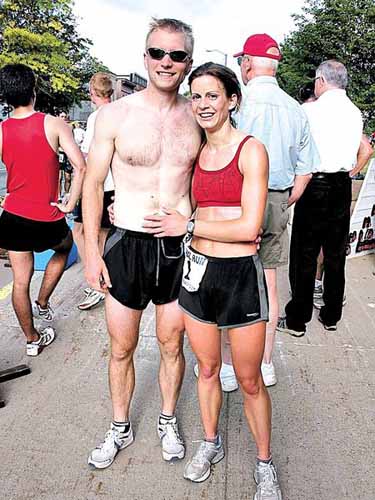Having the correct paper size and page number location is an important part of preparing a thesis or dissertation. Adobe Reader and Acrobat have tools that will help you verify these elements of your document.
The Graduate School is pleased to announce new theses and dissertations from the following programs:
- Applied Ecology
- Applied Natural Resource Economics
- Biological Sciences
- Chemistry
- Civil Engineering
- Electrical Engineering
- Environmental Engineering
- Forest Molecular Genetics and Biotechnology
- Geology
- Mineral Economics
- Rhetoric and Technical Communication
are now available in the J.R. van Pelt and Opie Library.

Karl Walczak and Margot Hutchins recently participated in the 35th annual Canal Run – and got married on the same day. The Canal Run holds a special place in their hearts, as they also announced their engagement at the same event one year ago.
The Graduate School wishes Karl and Margot the best as they begin their married life together.
Read more about Karl and Margot in the Daily Mining Gazette.
The Graduate School is proud to announce the following students are recipients of a one-time Summer 2010 Finishing Fellowship:
- Atakan Altinkaynak, Mechanical Engineering-Engineering Mechanics
- Rachel M Bradford, Biomedical Engineering
- Archana Pandey, Engineering Physics
- Edwar Romero-Ramirez, Mechanical Engineering-Engineering Mechanics
- Eric M Winder, Biological Sciences
The fellowships are made possible by the Graduate School.
Application procedures for the Graduate School fellowship programs and photographs of recent recipients can be found online. Nominations are currently open for Finishing Fellowships for fall semester. Nominations are due no later than 4pm on July 29, 2010.
The Graduate School is pleased to announce the following theses and dissertations are now available in the J.R. van Pelt and Opie Library:
Haiying He
Doctor of Philosophy in Physics
Advisor: Ravindra Pandey
Dissertation title: Electron Transport in Molecular Systems
Fei Lin
Doctor of Philosophy in Mechanical Engineering-Engineering Mechanics
Advisor: Mohan D Rao
Dissertation title: Vibro-Acoustical Analysis and Design of a Multiple-Layer Constrained Viscoelastic Damping Structure
Christopher Nelson
Master of Science in Industrial Archaeology
Advisor: Larry D Lankton
Thesis title: The C.R. Patterson and Sons Company of Greenfield, Ohio: Survival and Adaptation of a Back-Owned Company in the Vehicle Building Industry, 1865-1939
Brandon Rouse
Master of Science in Mechanical Engineering
Advisor: Jeffrey Donald Naber
Thesis title: Part Load Combustion Characterization of Ethanol-Gasoline Fuel Blends in a Single Cylinder Spark Ignition Direct Injection Variable Cam Timing Variable Compression Ratio Engine
Karl Walczak
Doctor of Philosophy in Mechanical Engineering-Engineering Mechanics
Advisor: Craig R Friedrich
Dissertation title: Immobilizing Bacteriorhodopsin on a Single Electron Transistor
At its regular meeting July 15, the Board gave final approval for Tech to offer two new PhD degrees, one in environmental and energy policy and another in geophysics.
The Board also:
- Kicked off the public phase of a $200 million capital campaign.
- Approved the building of a temporary home for the A. E. Seaman Mineral Museum.
- Approved the purchase of a building to be used for education efforts related to hybrid electric automotive technologies and the Keweenaw Research Center.
- Awarded the late Jacob R. Oswald an honorary posthumous Bachelor of Science degree in Forestry.
- Named a mechanical engineering research facility on Ethel Avenue in Hancock the Alternative Energy Research Building.
- Authorized the University to proceed with construction of the Great Lakes Research Center on the waterfront at Michigan Tech.
The Library has released a mobile catalog interface appropriate for use with cell phones, including iPhones, Androids, Blackberries, or other smartphones with Internet access. Using a mobile device, you can search the library’s catalog, view items you have checked out, or renew library materials.
Mobile browser can be linked to http://ils.lib.mtu.edu/vwebv/searchBasic?sk=mobile . For quick access, bookmark the site or add it to your device’s home screen. The QR code for the mobile catalog is also available.
The mobile pilot project was partially funded by the Center for Teaching, Learning and Faculty Development, with additional support from Information Technology. Computer science students in the Senior Software Engineering Project class assisted with the initiative.
Here is a list of participants:
Computer science members:
- Robert Pastel, assistant professor
- Ryan McMahon, computer science student
- Joshua Fahey, software engineering student
Library members:
- Haihua Li, web services librarian
- David Bezotte, library instruction coordinator
For questions and feedback, contact the Library Web Services at wwwlib@mtu.edu .
Published in Tech Today.
Adobe Acrobat has a Edit Text & Images Tool for content editing. This tool can be used to do minor text edits, such as deleting a small amount of text, or fixing a spelling mistake.
Open your pdf file, and select Edit Text & Images by clicking on “Tools” and selecting it from the “Content Editing” section as shown in the screen shot below. If you use the tool a lot, right click on the tool to “Add to Quick Tools” and it will appear on your toolbar.
All students completing a masters’s thesis or doctoral dissertation must submit their work to ProQuest. This tutorial is divided into four sections, which match the sections on the ProQuest submission webpage:
Alex Guth, a PhD student in geology, will be featured in an upcoming National Geographic Channel television series at 9 p.m., Sunday, July 25. Guth was interviewed in Kenya last year regarding the Rift Valley, and will appear in one of two back-to-back episodes of “Clash of the Continents.”‘
Published in Tech Today.